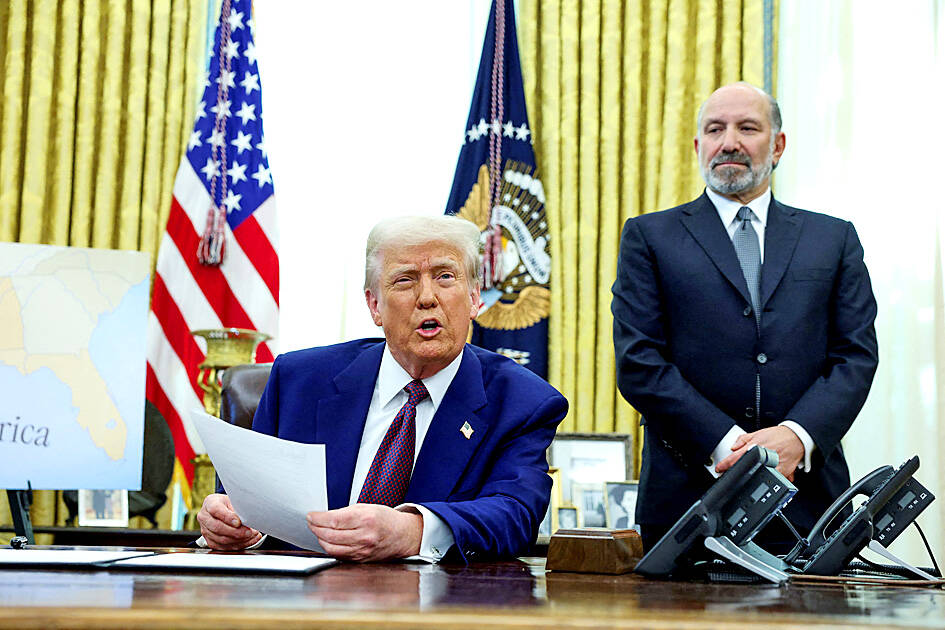Japan has asked to be exempted from the so-called reciprocal tariffs that US President Donald Trump plans to adopt this year as the Asian nation works to minimize any potential fallout.
Japanese Minister of Foreign Affairs Takeshi Iwaya sought the country’s exclusion from the tariffs when he met US Secretary of State Marco Rubio during the Munich Security Conference, according to a transcript of the meeting released on Saturday by Japan’s foreign ministry.
“I relayed my thoughts to Rubio that Japan should not be one of the countries subject to reciprocal tariffs,” Iwaya was quoted as saying.

Photo: Reuters
He also raised the issue of automobile tariffs and sought exclusion from the 25 percent tariff the US is to levy on imported steel and aluminum products.
The remarks followed Trump’s order to consider imposing reciprocal tariffs on numerous trading partners as soon as April, raising the prospect of a wider campaign against a global system he complains is tilted against the US. Trump has previously attacked Japan’s trade surplus with the US and yen weakness that feeds into that imbalance and recently singled out Japan, as well as South Korea, as nations that he believes are taking advantage of the US.
The Japanese government had begun communicating with Washington over tariff matters, Japanese Minister of Economy, Trade and Industry Yoji Muto told reporters on Friday.
The remark came as Trump said he would unveil new tariffs on automobiles.
“We are going to do that on around April 2,” Trump told reporters on Friday in the Oval Office, as he signed an executive order on energy policy.
The auto threat offers to put some of the biggest brands in Japan, Germany and South Korea in Trump’s crosshairs. Imports accounted for about half of the US auto market last year. About 80 percent of Volkswagen AG’s US sales are imported, while 65 percent of Hyundai-Kia’s US sales are imported, figures from market researcher Global Data showed.
Trump on Friday did not provide any details on the scope or rate of the potential auto levies. It is also unclear the effect they would have on vehicles built under the US-Mexico-Canada Agreement (USMCA), a free-trade agreement that Trump renegotiated during his first term. Auto production supply chains across North America are highly integrated.
The American Automotive Policy Council (AAPC) — which represents Detroit automakers General Motors Co (GM), Ford Motor Co and Stellantis NV — has called for Trump to drop proposed tariffs on Mexico and Canada.
“We support President Trump’s efforts to consider the entire global trade situation, including both tariff and non-tariff barriers,” AAPC president Matt Blunt said on Thursday in response to the announcement on reciprocal tariffs.
“In the meantime, Ford, GM, and Stellantis continue to believe that vehicles and auto parts that meet the USMCA requirements should not be subject to additional tariffs,” he said.
Additional reporting by AFP

UNCERTAINTY: Innolux activated a stringent supply chain management mechanism, as it did during the COVID-19 pandemic, to ensure optimal inventory levels for customers Flat-panel display makers AUO Corp (友達) and Innolux Corp (群創) yesterday said that about 12 to 20 percent of their display business is at risk of potential US tariffs and that they would relocate production or shipment destinations to mitigate the levies’ effects. US tariffs would have a direct impact of US$200 million on AUO’s revenue, company chairman Paul Peng (彭雙浪) told reporters on the sidelines of the Touch Taiwan trade show in Taipei yesterday. That would make up about 12 percent of the company’s overall revenue. To cope with the tariff uncertainty, AUO plans to allocate its production to manufacturing facilities in

TAKING STOCK: A Taiwanese cookware firm in Vietnam urged customers to assess inventory or place orders early so shipments can reach the US while tariffs are paused Taiwanese businesses in Vietnam are exploring alternatives after the White House imposed a 46 percent import duty on Vietnamese goods, following US President Donald Trump’s announcement of “reciprocal” tariffs on the US’ trading partners. Lo Shih-liang (羅世良), chairman of Brico Industry Co (裕茂工業), a Taiwanese company that manufactures cast iron cookware and stove components in Vietnam, said that more than 40 percent of his business was tied to the US market, describing the constant US policy shifts as an emotional roller coaster. “I work during the day and stay up all night watching the news. I’ve been following US news until 3am

COLLABORATION: Given Taiwan’s key position in global supply chains, the US firm is discussing strategies with local partners and clients to deal with global uncertainties Advanced Micro Devices Inc (AMD) yesterday said it is meeting with local ecosystem partners, including Taiwan Semiconductor Manufacturing Co (TSMC, 台積電), to discuss strategies, including long-term manufacturing, to navigate uncertainties such as US tariffs, as Taiwan occupies an important position in global supply chains. AMD chief executive officer Lisa Su (蘇姿丰) told reporters that Taiwan is an important part of the chip designer’s ecosystem and she is discussing with partners and customers in Taiwan to forge strong collaborations on different areas during this critical period. AMD has just become the first artificial-intelligence (AI) server chip customer of TSMC to utilize its advanced

Six years ago, LVMH’s billionaire CEO Bernard Arnault and US President Donald Trump cut the blue ribbon on a factory in rural Texas that would make designer handbags for Louis Vuitton, one of the world’s best-known luxury brands. However, since the high-profile opening, the factory has faced a host of problems limiting production, 11 former Louis Vuitton employees said. The site has consistently ranked among the worst-performing for Louis Vuitton globally, “significantly” underperforming other facilities, said three former Louis Vuitton workers and a senior industry source, who cited internal rankings shared with staff. The plant’s problems — which have not